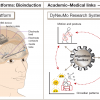Maternal Over- and Malnutrition and Increased Risk for Addictive and Eating Disorders in the Offspring
Evidence from human and animal studies has shown that maternal overnutrition and/or obesity are linked with neurobehavioral changes in the offspring. This fetal programming is characterized by adaptive responses to changes in the nutritional state during early life. In the past decade, an association has been made between overconsumption of highly-palatable food by the mother during fetal development and abnormal behaviors resembling addiction in the offspring. Maternal overnutrition can lead to alterations in the offspring’s brain reward circuitry leading to hyperresponsiveness of this circuit following exposure to calorie-dense foods later in life. Given the accumulating evidence indicating that the central nervous system plays a pivotal role in regulating food intake, energy balance, and the motivation to seek food, a dysfunction in the reward circuitry may contribute to the addiction-like behaviors observed in the offspring. However, the underlying mechanisms leading to these alterations in the reward circuitry during fetal development and their relevance to the increased risk for the offspring to later develop addictive-like behaviors is still unclear. Here, we review the most relevant scientific reports about the impact of food overconsumption during fetal development and its effect on addictive-like behaviors of the offspring in the context of eating disorders and obesity.
2017.Mov. Disord., 32(6):810-819.
2021. PLoS Comput Biol, 17(7)e1009213.

